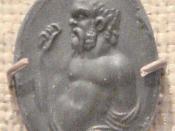Socrates was prompted to inquire into the essence of piety after he was sentenced to death on the grounds he impious. Socrates' love of challenging and questioning other's knowledge got him accused of creating social unrest. In response to the disturbance, a politician charged Socrates with impiety. Impiety is the most obvious grounds on which to charge an inquiring mind, because religion is not open to questioning. In theory a democratic political system, like that of Athens, should allow subjects to challenge ideas, however the Athenian democratic system was young and religious matters were still thought of as untouchable by humans. Therefore, Socrates' method of inquiry to acquire knowledge of the spiritual was unacceptable and threatening to Athenians.
Socrates' inquiry into the nature of piety was in the same manner that inspired his indictment for impiety. Socrates found Euthyphro, a man who claimed to understand piety, and asked him to define it.
Socrates found his answer wanton and made Euthyphro's ignorance clear. Socrates did not hesitate to do this, although coming to an agreement with Euthyphro could have saved his life. The stubborn Socrates clearly had a knack for alienating people.
As a side note: Though it is rumored Socrates was married, this is surely a fiction. In Athenian society women could have their say behind closed doors. Socrates' mental intelligence is evidenced in his developed ability to annoy others. However, his social ineptness is evidenced in the same fact. What woman would have put up with such impudence? As no reference is ever made to a constant red cheek (from being slapped), it is highly unlikely Socrates was actually married.
Despite Socrates' lack of intrapersonal skills, an oracle once called him the wisest man. This was due to his humility. Socrates assumed to know nothing, and thus could not...


